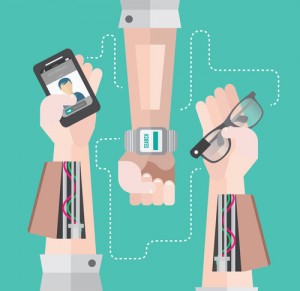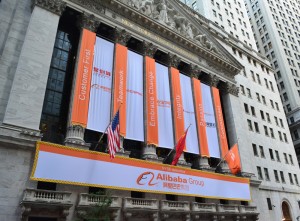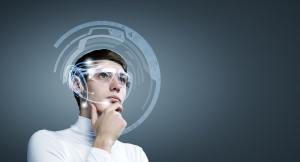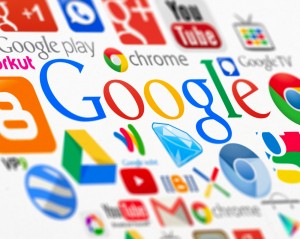Digitisation
In a landmark work on digital sovereignty(10), French digital entrepreneur Pierre Bellanger observes: “The internet has not added itself to the world we know, but has replaced it. The internet siphons our jobs, our data, our private lives, our intellectual property, our prosperity […] and our freedom.” All evidence up until now supports his thesis.
 A Boston Consulting Group study predicts that the personal data of 500 million Europeans, currently plundered by digital platforms from abroad, will be worth €1trn by 2020(11). Such platforms are hard at work capturing data from all around the world. Increasingly intrusive, but also with our consent, they monitor our smallest gestures, movements and consumer habits in order to anticipate, replicate and sell them. Today, their customers are consumer brands; tomorrow, they will be doctors, banks, insurance companies or even states anxious to maintain control over their populations.
A Boston Consulting Group study predicts that the personal data of 500 million Europeans, currently plundered by digital platforms from abroad, will be worth €1trn by 2020(11). Such platforms are hard at work capturing data from all around the world. Increasingly intrusive, but also with our consent, they monitor our smallest gestures, movements and consumer habits in order to anticipate, replicate and sell them. Today, their customers are consumer brands; tomorrow, they will be doctors, banks, insurance companies or even states anxious to maintain control over their populations.
Therein lies the trap of comfort and of things that appear to be free: who today would imagine paying for an email service, an electronic agenda or an internet search? The hidden cost is, in fact, immeasurable: it is a matter of our freedom, our private lives and our health. Certainly, today I have no problem with sharing personal information with an insurer or a health professional, if it will help me prepare for an accident or a serious illness. But what happens if tomorrow, my insurer analyses my data, learns I am highly likely to have a serious illness and refuses to assure my coverage? Who will I turn to for financial protection?
With our own consent and the mass complicity of traditional business, platforms plundering our personal data and private lives are growing into empires equipped with resources far superior to those of many of the world’s nations.
Indeed, what do France, Italy, Argentina and the United Kingdom, all of them crippled by huge debts and soaring deficits, as well as facing the burden of supporting aging populations, have against Google, Alibaba, Apple, Facebook and Amazon? These five companies have a combined value of around $1.6trn, several hundred billion dollars in reserves and investments in research and development – notably in robotics, nanotechnologies and the human genome – that will allow them to cement their leads on increasingly unstable nation states. Furthermore, while these states still aim to tax businesses in order to meet the needs of their populations, the agile and globalised digital giants contribute, each in its own way, to a worldwide tax evasion estimated between $5.5trn and $26trn(12).
These digital empires, for which it is not enough to avoid paying taxes, also seek to evade every form of national regulation that could impede their development. By way of example, we can cite the Seasteading Institute project to build giant ships that would hold offshore digital platforms outside of territorial waters, where they would not be subject to the regulations of any state.
 Tomorrow, who will be best positioned to finance and raise an army? Sovereign states, or Google, whose recent acquisitions of several military robotics firms (including Boston Dynamics) mean it will soon be able to build battalions of robots? Robots that will know you well, and be able to recognise you, thanks to your internet searches, your geolocations, your network of friends and contacts on social networks and Gmail.
Tomorrow, who will be best positioned to finance and raise an army? Sovereign states, or Google, whose recent acquisitions of several military robotics firms (including Boston Dynamics) mean it will soon be able to build battalions of robots? Robots that will know you well, and be able to recognise you, thanks to your internet searches, your geolocations, your network of friends and contacts on social networks and Gmail.
The new economy, of course, also has a positive dimension. It creates new services that are often free; it increases our effectiveness in a number of domains; it generates interesting jobs; it boosts a population’s quality of life. Who today could live or work “as before”, without email or portable phones, looking up information in a printed encyclopaedia rather than on the internet?
But does this new economy create jobs for everyone? The world’s top two private employers, McDonald’s and American distribution giant Walmart, together employ four million people. Their combined stock market value is $325bn, for an average “value” of $81,250 per employee.
This is very little compared with the stars of the new economy. Alibaba, Facebook and Google combined are worth nearly $800bn, but they barely employ 80,000 people, representing $10m of “value” per employee. From east to west, north to south, it may appear a worker in the new economy is worth a hundred times more than one of the traditional economy. But this value has a whole different meaning if we consider it from the opposite perspective: that the new economy has a hundred times less need for “human capital” than the traditional economy.
In their study “The Future of Employment”, Oxford researchers Michael Osborne and Carl Benedikt Frey(13) are unambiguous in their conclusion: the digitisation of human activities means 47 per cent of current jobs in the United States are at risk of disappearing(14). The trend of replacing people with machines has begun: electronic checkouts are replacing cashiers in supermarkets, while industrial robots are replacing labourers on assembly lines. Foxconn, a Chinese subcontractor of Apple and Nokia, announced in 2012 it plans to purchase a million robots to replace its labourers. The result will be a society in an hourglass, with a small group of winners on top and a much larger group that will fight amongst itself not to lose jobs that are less and less well paid.
 The deflationist and regressive reality of the new economy is particularly intimidating for those who have a job, for those who do not, and for those who have children – which is a lot of people. It contributes to reinforcing inequalities between those who understand and create new artificial intelligence systems and those who suffer from them. But even those at the top of the pyramid must fight to remain “competitive”, to stay alive in the economic sense. For that, teaching and learning itself is adapting: as the economy becomes globalised and digitised, education does too. A global education market is emerging, with universities seeking to recruit the best students and professors, wherever they come from, and to open campuses around the world(15). At the same time, more than six million students are already enrolled in massive open online courses(16), paving the way a standardisation and automation of training, with little regard for histories and cultures of origin, nor for the needs of men and women in their home countries.
The deflationist and regressive reality of the new economy is particularly intimidating for those who have a job, for those who do not, and for those who have children – which is a lot of people. It contributes to reinforcing inequalities between those who understand and create new artificial intelligence systems and those who suffer from them. But even those at the top of the pyramid must fight to remain “competitive”, to stay alive in the economic sense. For that, teaching and learning itself is adapting: as the economy becomes globalised and digitised, education does too. A global education market is emerging, with universities seeking to recruit the best students and professors, wherever they come from, and to open campuses around the world(15). At the same time, more than six million students are already enrolled in massive open online courses(16), paving the way a standardisation and automation of training, with little regard for histories and cultures of origin, nor for the needs of men and women in their home countries.
But, in the interest of productivity and profit, it is no longer enough to ensure human beings are well trained – it is far more convenient to remove them from the equation.
What worker could be more profitable and productive than an industrial robot that never sleeps, never balks at a task and has no personal problems districting it from its job? What driver could be more vigilant than an algorithm? And tomorrow, what programmer could be more effective and creative than a machine doted with a far superior artificial intelligence(17)?
Can humans survive this evolution? Already, those of us who are not “digital natives” – who have not grown up with digital devices – are overwhelmed by the flow. While human beings have proven they can adapt to anything – as they have with previous technological ruptures including the printing press, electricity, oil and railways – the condition is that it always takes time. However, how much time remains when algorithms can make elaborate decisions about investment and consumption that humans are no longer capable of making themselves, at their own pace, with time and reflection?
 The new economy does not mark a new step in technological progress at the service of humanity, which would be very welcome. On the contrary, it represents the great replacement of the human with the machine. However, this economic revolution is part of the real scientific, political and philosophical project known as transhumanism, whose ambition is to enhance human capabilities by fusing man and machine and, ultimately, to render humans immortal. Such is the crazy but conceivable project of Google, whose engineer in chief is none other than Ray Kurzweil, the apostle of transhumanism and author of successful books – including The Singularity is Near: When Humans Transcend Biology and How to Create a Mind – clearly detailing its aims and ambitions. Far from being the sort of shadowy project that fuels conspiracy theories, transhumanism expresses itself openly in Mr. Kurzweil’s books, just as it does in the products, innovations and acquisitions of Google. The project stopped having purely commercial or financial motivations long ago: it has become political and even religious, in the sense that it seeks to completely transform our way of life and our values. Transhumanism would use technological innovations to “enhance” the body to the point that humans achieve immortality. Nothing would be able to stop the spread of technology around us and even within our bodies – certainly not the boundaries of human ethics, which would be shattered in the process.
The new economy does not mark a new step in technological progress at the service of humanity, which would be very welcome. On the contrary, it represents the great replacement of the human with the machine. However, this economic revolution is part of the real scientific, political and philosophical project known as transhumanism, whose ambition is to enhance human capabilities by fusing man and machine and, ultimately, to render humans immortal. Such is the crazy but conceivable project of Google, whose engineer in chief is none other than Ray Kurzweil, the apostle of transhumanism and author of successful books – including The Singularity is Near: When Humans Transcend Biology and How to Create a Mind – clearly detailing its aims and ambitions. Far from being the sort of shadowy project that fuels conspiracy theories, transhumanism expresses itself openly in Mr. Kurzweil’s books, just as it does in the products, innovations and acquisitions of Google. The project stopped having purely commercial or financial motivations long ago: it has become political and even religious, in the sense that it seeks to completely transform our way of life and our values. Transhumanism would use technological innovations to “enhance” the body to the point that humans achieve immortality. Nothing would be able to stop the spread of technology around us and even within our bodies – certainly not the boundaries of human ethics, which would be shattered in the process.
Up until now, few countries have explicitly opposed the growing influence of transhumanism. In China, the Beijing Genomics Institute has been working on the DNA sequences of 2,200 “gifted” individuals, hoping to eventually inject “good” DNA into its population, to hold its own in global competition. In Europe, France and Germany have shown resistance, but for how long? German think tanks and government authorities are leaders in the protection of private lives online, as evidenced in the brave and clear-headed open letter of Axel Springer CEO Mathias Döpfner, “Why we fear Google(18)” – an all-out attack on the giant’s business model. In France, several digital entrepreneurs(19) have warned consciences and political authorities, mostly in Europe, of the dangers posed by these new tools of domination. Laurent Alexandre, a doctor and founder of Doctissimo, provides a crucial analysis of Google’s transhumanist project(20): from the multiplication of acquisitions of military robots to the registry of patent 8543339 B2(21), which allows Google to selectively sort the “best” human embryos, we discover a vision of human individuals and societies that must be “improved” and guided by technology.
Voices of dissent are growing in other European countries as well, particularly in Spain, Italy and Poland, where the unstable democracies of the 20th century have left an enduring wariness of totalitarian visions and their consequences: eugenics, the manipulation of bodies and minds, and the rejection of the weak, of those who used to be called Untermenschen, subhumans. In a transhumanist world, is it not the fate of all normal humans to become Untermenschen?
And tomorrow, how will we tell the difference between a human enhanced by robotics and a humanised robot? With each technological advance, this distinction becomes more blurred, and threatens to exclude “normal” humans from the system – more precisely, those who will not have had the financial means to integrate technological advances alongside or within their own bodies. There will be the “haves” and the “have-nots”. On one hand, we will have the poor, all-too-human humans, who fate is sickness and death, and on the other, the super-humans, those who deserve immortal life. There will be the humans without the technological “enhancements” required to appreciate or understand voting or participation in civil life, and the others, the “super citizens”, the only ones worthy of the privilege to vote. What democracy would be able to resist?
 ———————————————————————————–
———————————————————————————–
10. La souveraineté numérique, Editions Stock, 2014.
11. “Personal data value could reach €1tn,” Financial Times, 7 November 2012.
12. According to the International Monetary Fund and the Tax Justice Network, respectively
13. http://www.oxfordmartin.ox.ac.uk/downloads/academic/The_Future_of_Employment.pdf
14. In Europe, a similar study by The Bruegel Institute puts this figure at more than 50 per cent.
15. “The Globalization Of Higher Education”, Forbes, 28 July 2010.
16. Jeremy Rifkin, “The rise of anti-capitalism”, The New York Times, 15 March 2014
17. James Barrat highlights this idea in Our Final Invention: Artificial Intelligence and the End of the Human Era.
18. http://www.faz.net/aktuell/feuilleton/debatten/mathias-doepfner-s-open-letter-to-eric-schmidt-12900860.html
19. See Olivier Sichel and the Open Internet Project, as well as Godefroy Jordan and renaissancenumerique.org.
20. http://fr.openinternetproject.net/news/25-video-le-monde-futur-vu-par-google-et-decrypte-par-laurentalexandre
21. http://www.google.com/patents/US8543339


